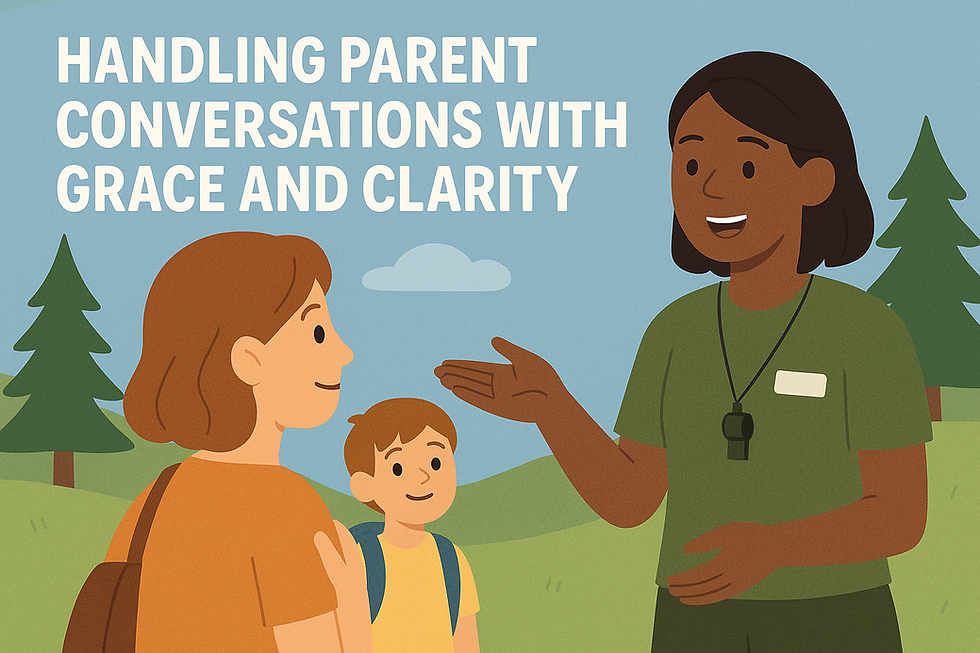Creating Lasting Memories: The Power of Camp Traditions
- Dalbir Singh
- Jun 26, 2024
- 4 min read

Camp traditions are more than just activities; they are the threads that weave together the fabric of unforgettable memories. Whether you're a seasoned camper or embarking on your first outdoor adventure, these traditions hold a special place in the hearts of those who experience them. Let's explore why camp traditions are so powerful in creating lasting memories.
1. Community Bonding
At the heart of every camp tradition lies a sense of community. Whether it's gathering around a campfire to sing songs or participating in a talent show, these rituals bring campers and counselors together. Shared experiences forge bonds that go beyond the duration of the camp session, creating friendships that can last a lifetime.
Example: Campfire Sing-Alongs
Many camps have a tradition of gathering around a campfire in the evenings to sing songs. Campers and counselors join in, sometimes with guitar accompaniment, creating a warm, communal atmosphere where everyone feels connected through music and shared experience.
2. Cultural Heritage
Many camp traditions have roots that stretch back generations. From classic campfire stories passed down through the years to unique games and ceremonies, these rituals connect campers to a rich cultural heritage. They provide a sense of continuity and belonging, allowing campers to feel part of something larger than themselves.
Example: Native American Powwows
Some camps incorporate traditions inspired by Native American cultures, such as organizing powwows where campers learn about traditional dances, songs, and rituals. These activities not only educate campers about indigenous cultures but also foster respect and understanding.
3. Sense of Belonging
For many campers, especially those who are away from home for the first time, traditions offer a sense of belonging and comfort. Knowing that they are part of a community that values these rituals can ease homesickness and foster a sense of security. Camp traditions create a familiar and welcoming environment where campers can truly be themselves.
Example: Welcoming Ceremonies
On the first day of camp, many places have welcoming ceremonies where new campers are introduced to the camp community. This ritual includes icebreaker games, introductions, and often a symbolic gesture like tying a camp bracelet or receiving a camp t-shirt, instantly making newcomers feel included.
4. Building Memories
The power of camp traditions lies in their ability to create lasting memories. Whether it's the excitement of winning a friendly competition or the laughter shared during a camp skit, these experiences become cherished moments that campers carry with them long after they leave camp. The nostalgia associated with camp traditions often brings former campers back year after year, eager to relive those special memories.
Example: Color War Competitions
Color wars are a classic camp tradition where campers are divided into teams (often represented by different colors) to compete in various games and challenges throughout the session. The friendly rivalry, team spirit, and memorable victories or defeats create lasting memories for campers.
5. Personal Growth
Beyond the fun and camaraderie, camp traditions also play a role in personal growth. They teach valuable lessons about teamwork, creativity, and resilience. Whether it's learning to work together to build a campfire or overcoming stage fright during a performance, these experiences help campers develop confidence and skills that extend far beyond their time at camp.
Example: Talent Shows
Camp talent shows provide a platform for campers to showcase their talents, whether it's singing, dancing, playing an instrument, or performing skits. Overcoming stage fright, practicing teamwork for group performances, and receiving positive feedback from peers all contribute to personal growth and confidence-building.
6. Creating New Traditions
While many camp traditions have deep roots, camps also have the flexibility to create new rituals that resonate with current campers. Whether it's incorporating environmental stewardship projects or celebrating diverse cultural traditions, camps can evolve their traditions to reflect the values and interests of their community.
Example: Environmental Conservation Projects
In response to growing environmental awareness, many camps have started traditions centered around sustainability and conservation. This might include tree planting ceremonies, recycling challenges, or nature walks focused on identifying local flora and fauna. These activities instill a sense of responsibility for the environment among campers.
Embracing the Power of Camp Traditions
Camp traditions are a cornerstone of the camp experience, enriching the lives of campers and counselors alike. They provide opportunities for connection, growth, and joy, creating a tapestry of memories that define the camp experience. Whether you're roasting marshmallows around a campfire or singing camp songs under the stars, these traditions remind us of the magic and camaraderie that make camp such a transformative experience.
These examples illustrate how camp traditions can vary widely while serving common purposes of fostering community, preserving cultural heritage, creating belonging, building memories, promoting personal growth, and evolving to reflect contemporary values. Each tradition contributes uniquely to the overall camp experience, leaving campers with cherished memories that endure long after their time at camp.
As you embark on your next camp adventure, take a moment to appreciate the traditions that make your camp special. From the oldest campfire songs to the newest camp traditions, each ritual adds depth and meaning to your camp experience. Embrace these traditions, cherish the memories they create, and carry them with you wherever your journey may lead.




Comments